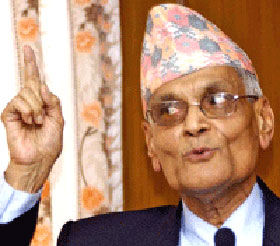
The most salient strand of substance to emerge from Dr. Tulsi Giri's latest newspaper interview, in Maila Baje's view, is his bewilderment at the amorphousness of the royalists' ideology.
The vice-chairman of crown-led cabinet is the kingdom's royalist in chief. The fact that he should be expressing such exasperation says a lot.
Dr. Giri is sometimes quoted as having declared himself the mother of the Panchayat system. Regardless of the authenticity of that attribution, he has stood up defiantly in defense of his beliefs – most awkwardly during King Birendra's reign.
He shares with Surya Bahadur Thapa the distinction of having been imprisoned by the very system he defended as head of government.
When Narayanhity tried to play both the liberal and hardliner act to project partylessness as benevolent authoritarianism, as opposed to outright autocracy, Dr. Giri wasn't too amused. Adult franchise and partylessness, in his view, were antithetical.
He quit his post as chairman of Panchayat's 25th anniversary celebrations committee and flew into exile in Sri Lanka and later India. He changed his religion but not his resoluteness.
He steadfastly refused to dabble in politics. Nepal Television's gaudy Bijay Kumar failed to elicit even an ambiguous answer in the late 1980s when he asked Dr. Giri how he rated his chances of returning to active politics.
Dr. Giri's change of heart coincided with King Gyanendra's enthronement. In 2002, he broke his political silence by telling a reporter in Bangalore that Afghanistan would look like a picnic if Nepal's ethnic and linguistic fault-lines were allowed to widen.
Still, few were ready to rate him any higher than a political has-been. Senior leaders of the Nepali Congress – the party Dr. Giri had ditched a generation ago to "conceive" the partyless system -- had crowned Sher Bahadur Deuba as the perfect incarnation of the man that continued to roil their blood.
The royal step of October 4, 2002 seemed to have persuaded Dr. Giri that his time had come. In fact, some theorize that Girija Prasad Koirala, Madhav Kumar Nepal and Co. agreed to King Gyanendra's appointment of Lokendra Bahadur Chand as premier only to prevent Dr. Giri from entering Singh Durbar. (Dr. Giri, then on his first visit to Nepal in years, had met King Gyanendra during the consultations following the dismissal of Deuba.)
As vice-chairman, Dr. Giri has lost none of his trademark anti-Indian vitriol. He has shown how exile and incumbency are entirely two different things. (Imagine where India would be today if Gandhi and Nehru had remained overly beholden as one-time students in Britain to their benefactors there.)
Among Dr. Giri's principal contentions:
*A section of royalists are busy offering the king bouquets during celebrations while others are behind the monarch just to get government posts.
*Sovereignty lies in the people. “If people can hand sovereignty to parliament for five years, why can’t they do it to the king?”
*The king is not the symbol of divine power or a reincarnation of Lord Vishnu but is established on the trust of the people.
*The current fight in the country is absolutely ideological. “Multi-party system is not synonymous with democracy. If political parties have the right to demand a republican order, we also have the right to demand monarchical democracy.”
Amen to all of the above. The "ideology" school of thought needs amplification. Events have been coalescing for a while but remain to acquire coherence of thought.
Consider this: Former Nepali Congress and UML stalwarts Prakash Koirala and Radha Krishna Mainali are in the royal cabinet. Former zonal commissioner Surya Bahadur Sen Oli has emerged as a key royal critic.
Under the Panchayat system, the first two men suffered exile and imprisonment largely because of their opposition to the palace. The third enjoyed full power and perks under royal patronage.
The temptation to explain this realignment on the basis of personal preferences or prejudices is flawed.